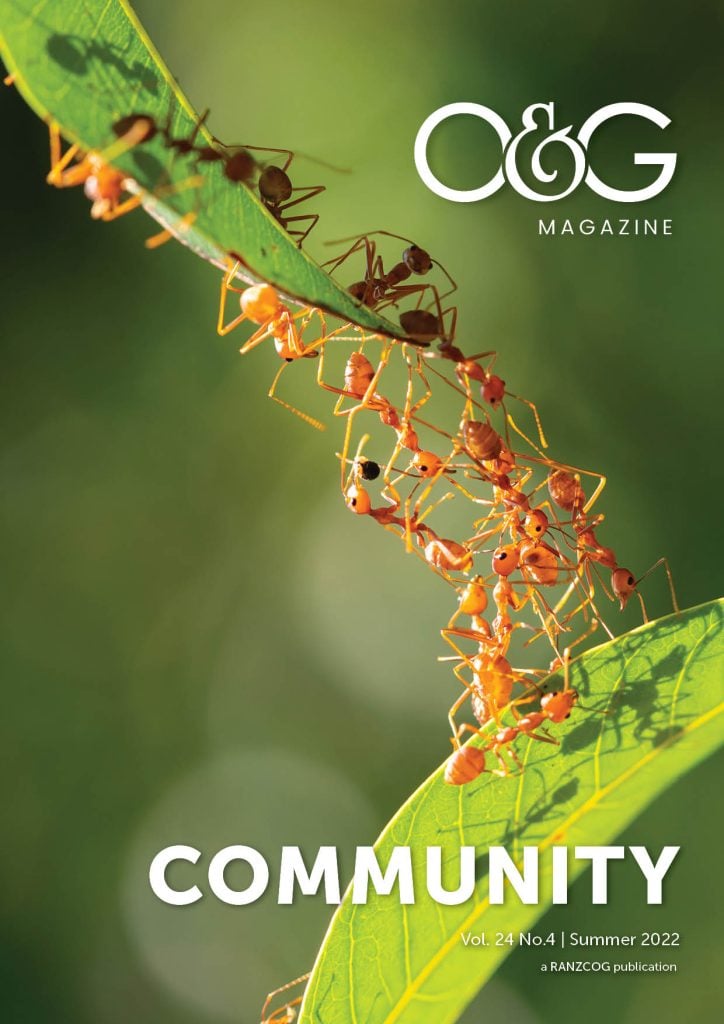This is the full version of the Past President’s speech delivered at the RANZCOG Annual Scientific Meeting, held on Australia’s Gold Coast in October 2022. The full title is ‘The limitations of a narrow definition of normal and the cost of ‘othering.’
Good morning. I respectfully acknowledge the Kombumerri families of the Yugambeh language region, the traditional owners of the land on which we meet, and pay my respect to their elders past and present, and all Aboriginal and Torres Strait Islander Peoples here today.
I reaffirm my commitment to the reconciliation journey, because at its heart, reconciliation is about strengthening relationships between Aboriginal and non-Aboriginal peoples, for the benefit of all Australians. RANZCOG is a bi-national College and I recognise Māori as tangata whenua in Aotearoa New Zealand and our obligations as Te Tieriti O Waitangi partners
Recognition of all First Nations people is a good place to start when talking about culture and the impact of defining “normal”. We have become so used to commentary on the health outcomes for Māori in Aotearoa, and Aboriginal and Torres Straits Islander people in Australia, that there is a huge risk that we will allow this inequity to continue. Sort of business as usual. For many years we have tinkered at the edges. To bring about meaningful change requires significant disruption, radical thought, commitment, financial resources and personnel. It requires a First Nations workforce that is empowered to lead and make meaningful decisions. It requires an attitude from society and the medical profession that there are different ways to deliver healthcare and a willingness to listen rather than instruct. It requires the dominant culture to step back and support self-determination.
Einstein demonstrated that if we look at anything through a different lens, what we perceive will be different. In his example, he used a moving train through the perspective of two different people. One person who is sitting on the train, the other standing outside of the train. If lightning strikes the train at both ends, the person standing outside will say the bolts were simultaneous because the light will hit their eyes at the same time. However, the person sitting on the train who is facing towards the front of the train will say that lightning strike from the back of the train came afterward because the light wouldn’t reach their eyes until after the strike at the front of the train happened. Both perspectives are true, but it depends on which lens you’re looking through – it’s all relative. His theory mainly applies to physics, but we can also apply this to life as well.Why is that I look at the world one way and someone else sees it so differently? My talk today isn’t specific to obstetrics and gynaecology. We are more than obstetricians and gynaecologists, general practitioners, midwives, nurses, students, College staff. We’re people on the planet, part of the fabric of society, and what we say and do makes a difference. What I want to talk about today is what it means to be part of the dominant culture and what it feels like to sit outside that.
For those who are members of the dominant culture, to begin with, this discussion doesn’t make sense. They know their place. They know that they belong. What does it feel like if you don’t belong?
The Italian philosopher Antonio Gramsci developed the concept of cultural hegemony out of Karl Marx’s theory that the dominant ideology of society reflects the beliefs and interests of the ruling class. Gramsci argued that consent to the rule of the dominant group is achieved by the spread of ideologies – beliefs, assumptions, and values – through social institutions such as schools, churches, courts, and the media, among others. These institutions do the work of socialising people into the norms, values, and beliefs of the dominant social group. As such, the group that controls these institutions controls the rest of society.
What does that mean in English? It means that if a powerful group keeps on stating what is normal, then that becomes the truth. It’s normal for men to be in charge. It’s normal to wear Western clothes and ‘exotic’ to wear a sari. It’s normal to birth in a hospital and ‘alternative’ to birth at home. Christianity is normal and every other religion is different. If you’re not white, then you’re grouped as a ‘person of colour’. Has anyone thought about an expression ‘person without colour’?
Cultural hegemony is most strongly manifested when those who are ruled by the dominant group come to believe that the economic and social conditions of their society are natural and inevitable, rather than created by people with a vested interest in particular social, economic, and political orders. In other words, we all get sucked into it, and even those who are disenfranchised accept the situation.
If you’re white, wealthy, educated and healthy it makes sense that the way that you view the world is the way that the world is. Unconscious bias isn’t a moral failing, but it is an impediment to the way that we interact with other people. Do you cross the road when you see a big Māori man coming towards you? Do you assume that a woman wearing a hijab is uneducated and dominated by her husband? Do you think that an obese person is lazy, eats junk food and is less likable? When I was growing up there was a narrative that Indians had lots of children because many would die, and they were ok with that. Until very recently we genuinely believed that a man in a wheelchair couldn’t be a doctor.
While I was writing this talk, I repeatedly asked myself why was I writing this talk and what did I hope to achieve? As I get older, I visualise a photograph of my life, my history, my culture, and the story of my family. Slowly I see that photograph fading until eventually there is no record, no memories and that my history has dissolved into the history of white Anglo-Saxon Australia. At the same time, I reflect on my own privilege. I’ve had the benefit of being born in Australia, education, wealth and good health. I’ve been assimilated into the dominant culture because my accent’s acceptable and I enjoy a beer and a pie and cricket. Where I am now is a result of that privilege.
So what I wanted to try to convey today is the importance of challenging ourselves. And this challenge is for every one of us. Every person is at risk of othering others. It’s a mistake to think that because you’re not white, because you’re female, because you’re gay or have cerebral palsy that the default to othering doesn’t apply to you.
But the reality is that the dominant gender, the dominant races, the dominant religions and the dominant sexes do have the most impact. It’s a logical fallacy, false equivalence, to say things like “it’s hard when I’m the only man in the group” or “it was tough for those on the First Fleet too” or “I’m the only white person here.”
Othering is often subtle and may involve unconscious assumptions about others. For example:
- Attributing positive qualities to people who are like you and negative qualities to people who are different from you
- Believing that people who are different from you or your social group pose a threat to you or your way of life
- Feeling distrustful or upset with people of a social group even though you don’t know anyone from that group
- Refusing to interact with people because they are different from you or your social group
- Thinking that people outside your social group are not as intelligent, skilled, or as special as you and your group
- Thinking of people only in terms of their relationship with specific social groups without giving any thought to them as individuals
So now that we’ve identified the issue, where do we go from here? Is it all hand-wringing and guilt? Are all white people, all men, all heterosexuals bad? Let’s not give in to that. That’s a weak and gutless response. First, we need to accept that the argument is true. This is a real issue. We need to accept that people genuinely are othered and suffer from racism, sexism and every other form of discrimination. It’s true. It’s real and it’s deep. Then, rather than responding defensively, we need to be open to saying “oh…I didn’t realise that I was thinking that way” or “I wasn’t aware of the impact of my words, actions, behaviour”. We need to seek guidance, to be open to change, willing to challenge our premises, confront our unconscious biases.
If we’re going to change the paradigm, some of that journey is going to be uncomfortable. Nobody likes conflict or confrontation, but we can’t just hope that things will change through wishing for it. Those of us who have power will have to accept our responsibility to speak up when we observe biased behaviour. People are less likely to engage in othering when it is socially unacceptable. When the powerful don’t speak up, it becomes more acceptable to engage in those same types of behaviours. I don’t want to stand up here like some holier than thou preacher telling everyone else what to do and say. But I’ve thought about that and decided that it isn’t ok to be in a powerful position and not to speak up. That’s cowardly and disingenuous. Importantly, the powerful must not speak for others. Rather we should stand alongside them. And we should listen when they speak for themselves.
The biggest barrier to moving to a society that increases equity for all is that the naysayers cast the argument through a deficit lens. If we allow same-sex marriage it will lead to a breakdown of social order. If we enshrine an Indigenous Voice in the Constitution we will lose all of our land. If we have affirmative action for women all the men will lose their jobs. If patients have a say in how they want to be informed and cared for, no-one will listen to doctors and we’ll be the ones who get sued when it goes wrong. An Indigenous person just got the job because they were given a leg-up.
Another push-back is “what am I supposed to do?” and “you can’t even compliment a woman on her looks anymore” or “how am I supposed to tell if they’re a he or a she?”. Seriously? Well, I’m sorry that you’re having a rough time. I’m sorry that you have to pause and think. What if I put it another way? Did any person ever walk away, having hurt another person, intentionally, or not, and feel good about it? I didn’t think so.
The beauty of diversity and inclusion is that I can finish on a positive note because this is a positive story. Did any person ever say a kind word, show compassion, or respect, and regret it? Rather than seeing inclusion through a deficit lens, we can reflect on how much we’ve missed out on through exclusion, and how much there is to gain through full and equal participation. For all of human history we have missed out on 50% of the population. How those women suffered but how much opportunity was lost. If we exclude others from full participation, we all miss out. Imagine music with just one beat, food with just one taste, a picture with just one colour. Imagine if all accents were the same, if we all looked the same, if we didn’t need to go through a process of listening and understanding, growing and learning. Equity is not just about letting the other person in. It’s about creating an opportunity for ourselves and for society as a whole.
I think that our College is moving in that direction. We need to keep talking about it. We need to keep pushing and reminding ourselves. I believe in the inherent goodness of people and we are good people. Let’s invite everyone to the party. That’s the first step. The next step, when they come to the party, is to reach out, and ask them to dance.






Leave a Reply